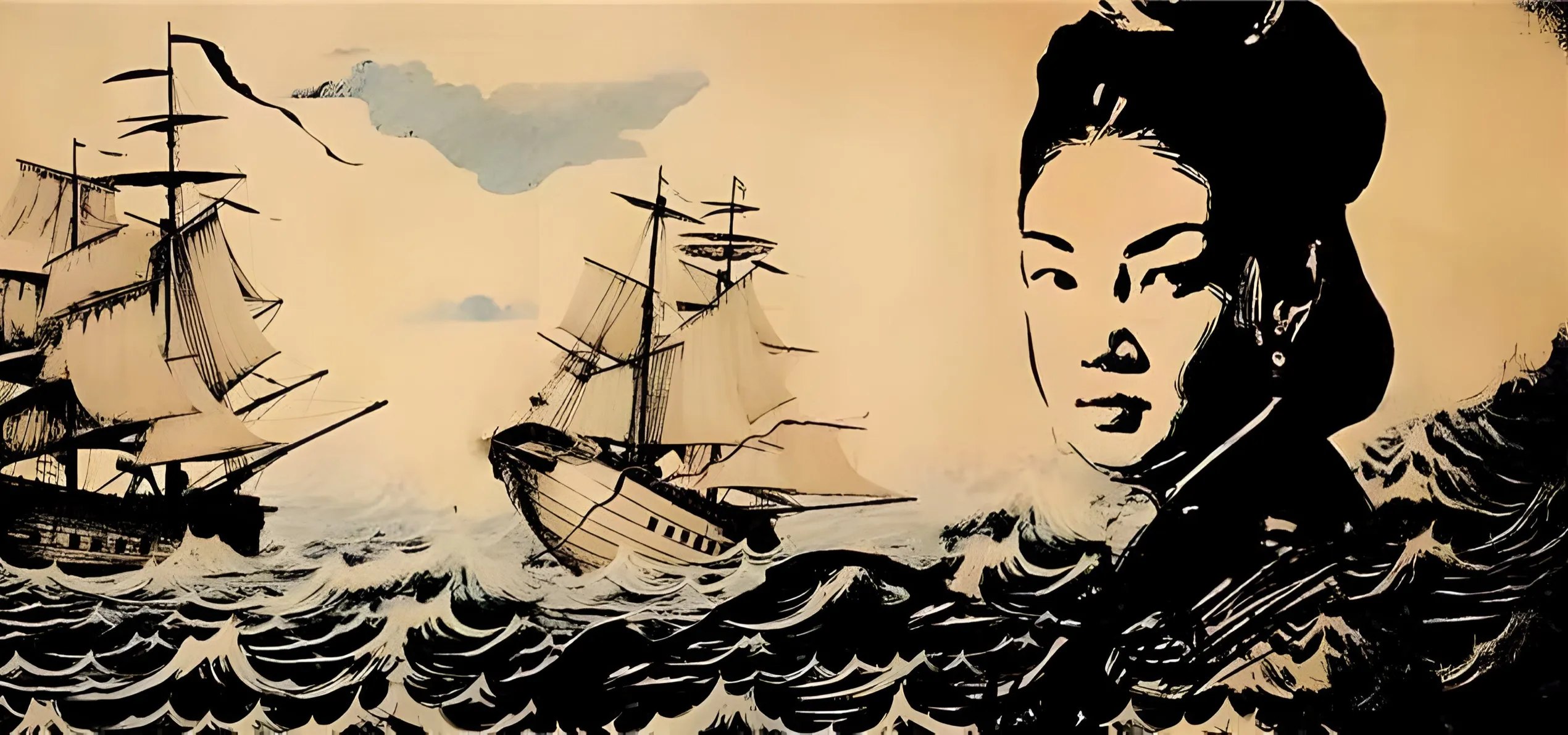Beardless, brilliant, and Chinese—Zheng Yi Sao fought off navies and amassed a huge fortune
I n 1801, a pirate named Zheng Yi was busy raiding Guangzhou. Aside from the typical plundering and rum-drinking, he had given his men one specific order: to break into a local brothel and bring him a prostitute by the surname of Shi.
While one might have anticipated a grim fate for Ms. Shi upon her delivery to the pirate captain—rape, swiftly followed by murder, would not have been out of the ordinary—Zheng Yi’s intentions proved to be considerably more gentlemanly.
He intended to marry her. Recognizing that her current career prospects were rather limited, Shi accepted.
Though history records her simply as Zheng Yi Sao (郑一嫂), or “Zheng Yi’s wife,” this 26-year-old woman didn’t intend to spend the rest of her days as mere eye candy for some treasure-hunting pirate. She wanted to become a pirate herself, and she did. In fact, she became one of the greatest pirates to have ever lived.
Zheng Yi Sao immediately displayed a staggering degree of cunning. She accepted Zheng Yi’s proposal, but only on the condition that he share his wealth and power with her equally. Then, while her new husband went about his pirate duties—further plunder and rum-drinking, presumably—she focused on the business side of things. The result was that in six years, she had engineered an alliance between Zheng Yi and his former pirate rivals, amassed a force of some 1,500 ships called the Red Flag Fleet, and created a swashbuckling empire that extended from Korea to Malaysia.
Zheng Yi was killed in 1807 during a typhoon—unfortunate for him, but extremely fortunate for Zheng Yi Sao. Refusing to step aside like a good, diligent widow, Zheng Yi Sao took charge of the Red Flag Fleet, convinced her late husband’s first mate to support her, and swiftly set about making herself the most respected and feared individual in all China’s seas and beyond.
If films, books, and video games have taught us anything, it’s that pirates were a rowdy bunch at the best of times, and their attitudes toward women were…less than progressive. Zheng Yi Sao was having none of that and quickly established a new pirate code to keep her peg-legged men in line. Anyone who looted a town that had already paid tribute to the pirates had their head cut off and dumped in the ocean. Anyone caught, or even suspected, of stealing from the pirate treasury had their head cut off and was dumped in the ocean. Anyone who raped a female prisoner had their head cut off and was dumped in the ocean. You can see the pattern here.
Not all Zheng Yi Sao’s laws involved decapitation though. She also decreed that when a crew member purchased a female captive, he had no choice but to marry her, while the remaining women were released.
But if he was unfaithful to her (you guessed it), his head was cut off and he was dumped in the ocean.
After just one year of leading her pirate hegemony, Zheng Yi Sao had formed one of the largest navies on the planet, with some 17,000 men under her command. Tributes extorted from merchants across the Chinese seas and the coastal towns between Macau and Guangzhou swelled her treasury to obscene levels. Her power was so great that she became the de facto government of the region. No longer was she merely a pirate; she was a political entity.
Quite understandably, the reigning Qing dynasty (1616 – 1911) emperor wasn’t too thrilled with Zheng Yi Sao’s ability to supplant his divine authority, so he commissioned an imperial navy to put an end to her eye-patched enterprises.
Zheng Yi Sao won hands down.
Not only did she defeat the emperor’s forces, but captured 63 of his ships and persuaded many of his men to join her. How did she persuade them? They were given a choice: join her crew and enjoy the complimentary rum, or be tied to the deck and be beaten to death. It was (assumedly) an easy decision to make.
Over the next two years, the Qing government kept up its offensive, even going so far as to hire the British and Portuguese navies to see Zheng’s fleets off. Those two nations were totally unparalleled in their seafaring prowess at the time...and Zheng Yi Sao crushed them both. There was simply no stopping her.
Despite her achievements, Zheng Yi Sao knew when to quit. Sick and tired of constant defeat, the emperor offered an amnesty for all pirates in 1810—if Zheng Yi Sao would agree to make peace. Recognizing that her good fortune would not last forever, Zheng Yi Sao went to the negotiating table. She showed up unannounced at the home of the governor-general of Guangzhou, convinced him to sign a treaty with her despite her gender, and secured quite possibly the most generous pension package ever.
Not only did she get her pardon, along with pardons for the majority of her men, but she also retained ownership of all her treasure. After docking her ship for the last time, she promptly married her late husband’s first mate and, at the age of 35, retired to a life on the mainland, where she opened a gambling den and brothel.
She ran her new, less pirate-y business for the rest of her life, and by the time she passed away at the age of 69, she had not only become a living legend but also a mother and a grandmother.
No doubt she had some interesting bedtime stories to tell her grandkids.
“The Greatest Pirate Who Ever Lived” from our archives. It was originally published in 2012. To read the whole piece, become a subscriber and receive the full magazine. Alternatively, you can purchase the digital version from the Apple App Store.












